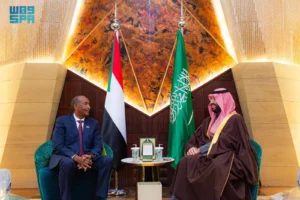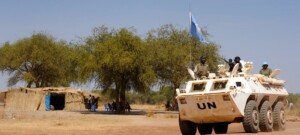Darfur janjaweed leader Ali Kushayb brands ICC charges ‘misleading falsehoods’
Appearing for the second day before Trial Chamber I of the International Criminal Court (ICC) in The Hague, the Netherlands, Ali Muhammad Ali Abdelrahman (known as ‘Ali Kushayb’) has reiterated his denial of guilt in an unsworn statement from the dock, branding the accusations against him as “misleading falsehoods”.
 Ali Muhammad Ali Abdelrahman (known as ‘Ali Kushayb’) consults with his defence team before the start of his trial at the ICC on Tuesday (Photo: ICC)
Ali Muhammad Ali Abdelrahman (known as ‘Ali Kushayb’) consults with his defence team before the start of his trial at the ICC on Tuesday (Photo: ICC)
Appearing for the second day before Trial Chamber I of the International Criminal Court (ICC) in The Hague, the Netherlands, Ali Muhammad Ali Abdelrahman (known as ‘Ali Kushayb’) has reiterated his denial of guilt in an unsworn statement from the dock, branding the accusations against him as “misleading falsehoods”.
The trial of the former Darfur janjaweed leader on 31 counts of war crimes and crimes against humanity began at the ICC on Tuesday, during which ICC Chief Prosecutor Karim Khan presented a litany of alleged atrocities, committed particularly in Kutum (referred to in court papers as Kodoom), Bindisi, Mukjar, and Wadi Salih in Darfur, including “rapes, children being targeted and attacked and abducted, men and boys being executed, homes being wantonly destroyed…” Abdelrahman has pleaded ‘not guilty’ to all charges.
The accused began his unsworn statement on Wednesday by declaring his full name to be Ali Mohammed Ali Abdelrahman*, highlighting that he is of the tribe of El Taisha. He said that the current leader of El Taisha is a grandson of Kaliph Abdallah “the founder of Sudan… he has marked the History of Sudan since 1916.” He continued: “El Taisha tribe is in no conflict with any other tribe in Sudan… El Taisha is a tribe of peace and harmony.”
Ali Muhammad Ali Abdelrahman (known as ‘Ali Kushayb’) delivers his unsworn statement
to the ICC on Wednesday (Video: ICC)
Referring his to transfer to the ICC’s custody on June 9, 2020, after surrendering himself voluntarily in the Central African Republic, Abdelrahman said: “I came of my own free will. No one brought me here. I came here to correct the misleading falsehoods attributed to me, and I congratulate the International Criminal Court for being a fair court of law.”
Abdelrahman then addressed “the gentlemen in charge of the Transitional Military Council in Sudan under the command of Gen Abdelfattah El Burhan the chairman, and Gen Mohamed Hamadan Dagalo the deputy chairman, Gen Shamseldin Kabashi, Gen Yasir El Ata… to them I say, you are to prioritise the Sudanese people and their security, in the hope that the elections of 2023 be held properly.”
Abd-Al-Rahman expressed hope “that the people of Sudan will be successful and that they will live in peace and security”.
Abd-Al-Rahman: “Lastly, we pray for the souls of the martyrs, from all tribes in Sudan who gave their lives during the tribal disputes, the acts of rebellion, and during protests…”
The current phase of the trial, under the gavel of Presiding Judge Joanna Korner, who is assisted by Judge Reine Alapini-Gansou and Judge Althea Violet Alexis-Windsor, is expected to continue until Friday.
Background:
* From the start of pre-trial proceedings, Ali Kushayb’s defence has always pivoted on ‘mistaken identity’, saying that he is not the person who perpetrated these crimes. However on the opening day of the trial on Tuesday, senior trial lawyer for the prosecution, Julian Nicolls, told the court that the prosecution intends to present several witnesses (referred to only by a number for anonymity), who will testify that the accused is indeed Ali Kushayb, the feared so-called ‘Colonel of Colonels’.
Lead-up to trial
On November 2, 2021, The Appeals Chamber of the ICC unanimously rejected an appeal by Ali Kushayb, against the Pre-Trial Chamber II decision of 17 May 2021, rejecting a challenge of the court’s jurisdiction by Kushayb’s defence counsel.
The Appeals Chamber of the ICC, composed of Judge Piotr Hofmański, presiding in this appeal, Judge Luz del Carmen Ibáñez Carranza, Judge Perrin de Brichambaut, Judge Solomy Balungi Bossa, and Judge Gocha Lordkipanidze, decided unanimously to reject the appeal against the Pre-Trial Chamber II decision of 17 May 2021 on the Defence’s jurisdictional challenge (exception d’incompétence).
Presiding Judge Piotr Hofmański, in rejecting the Defence’s four grounds of appeal, the Appeals Chamber highlighted, among other matters, that it found no error in the reasons given by the Pre-Trial Chamber defining a “situation” before the Court as defined in terms of temporal, territorial and in some cases personal parameters. It also found that the non-funding by the United Nations of the activities of the Court arising from a referral by the Security Council does not invalidate the UNSC resolution 1593 which referred the situation to the ICC. As for the alleged failure of the Pre-Trial Chamber to take into account the lack of the Security Council logistical and security support to the Court in Sudan, the Appeals Chamber finds that the Defence has not demonstrated how this alleged error of law relates to the jurisdiction of the Court.
Finally, and referring to the principle of legality, nullum crimen sine lege, the Appeals Chamber found that the referral of the Situation in Darfur, Sudan took place in the wake of serious violations of human rights and humanitarian law that were criminalised under international law at the time.
The Appeals Chamber also found that the crimes under the Statute were intended to be generally representative of the state of customary international law when the Statute was drafted. This weighs heavily in favour of the foreseeability of facing prosecution for such crimes even in relation to conduct occurring in a State not party to the Statute. Judge Ibáñez expressed her separate views concerning this ground of appeal and while agreeing with the outcome reached by the majority, she considered that, in her view, the jurisdiction of the Court over the conduct in this case pre-dates UNSC Resolution 1593, which only triggered the Court’s jurisdiction and thus there is no need to refer to any other sources of law.
Indictment
As previously reported by Radio Dabanga, Kushayb initially appeared before the ICC on June 15.He then appeared before Pre-Trial Chamber II on May 24-26 to hear submissions from the prosecution and legal representation of the victims.
The ICC issued arrest warrants against former Minister for Humanitarian Affairs, Ahmed Haroun, and Kushayb in 2007. Kushayb was transferred to the ICC’s custody on June 9, 2020 after surrendering himself voluntarily in the Central African Republic. Upon his arrest, the Sudanese government announced its support for his transfer to the ICC. Kushayb is also charged with a number of crimes by the Sudanese authorities.











 and then
and then